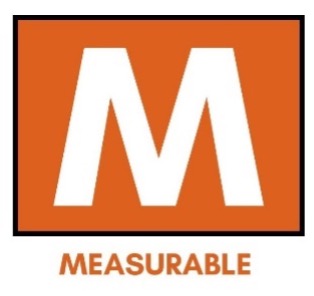If you’re tired of another meeting that could have been an email, it’s time to start implementing SMART goals and encouraging your employees to do the same.

What are SMART goals in business?
SMART goals in business are those that are Specific, Measurable, Achievable, Relevant, and Time-Bound. They can be instrumental in breaking down long-term projects into manageable and actionable steps for your entire team. SMART goals also help engage team members, and engaged teams generate 21% more profit than disengaged ones.1
Now, let’s dive into the different parts of a SMART goal!
What does the S in SMART goals stand for?
The S in SMART goals stands for specific. Specific goals are clearly defined goals that eliminate ambiguity. That way, everyone on the team understands what success looks like.

What does the M in SMART goals stand for?
The M in SMART goals stands for measurable. As in, how will you measure the results of your efforts? A business SMART goal should include a set of criteria for measuring progress. If you measure your efforts and find out you are going to fall short of your goal, you may need to reevaluate and adjust accordingly.

What does the A in SMART goals stand for?
The A in SMART goals stands for achievable. This means that accomplishing the goal should be achievable and realistic. After all, an unattainable objective can quickly lead to frustration and burnout for everyone involved.

What does the R in SMART goals stand for?
The R in SMART goals stands for relevant. A business SMART goal should be relevant to the broader business objective. And if you can’t figure out how it’s relevant, it may not be worth doing.

What does the T in SMART goals stand for?
The T in SMART goals stands for time-bound, aka, a timeline/deadline. When is the goal due? Everyone on the team should be aware of the deadline so there are no excuses for not delivering.

SMART goal example for work
Now, it’s time to review a SMART goal example for work.
Goal: A small business wants to increase revenue through targeted digital marketing efforts.
- Specific: Increase online sales revenue by 20% by implementing a targeted digital marketing campaign focusing on social media ads, email marketing campaigns, and search engine optimization (SEO).
- Measurable: Track key performance indicators (KPIs) such as website traffic, conversion rates, average order value, and total online sales revenue using Google Analytics and sales reporting tools.
- Achievable: Allocate a monthly budget of $2,000 for digital marketing efforts and hire a part-time digital marketing specialist to provide support to current team members.
- Relevant: The goal is relevant to the overall business objective of increasing revenue and expanding the customer base.
- Time-bound: Achieve a 20% increase in online sales revenue within six months.
- End of Month 1: Launch initial social media ad campaign and send first email marketing campaign.
- End of Month 2: Optimize SEO strategy and improve website content.
- End of Month 3: Evaluate the performance of campaigns and make necessary adjustments.
- End of Month 6: Review overall progress and achieve the targeted 20% increase in online sales revenue.
SMART Goal Summary
The goal is to increase online sales revenue by 20% by implementing a targeted digital marketing campaign. Progress will be measured by KPIs. To achieve this, there will be a $2,000 monthly budget allocated for digital marketing efforts and a part-time digital marketing specialist will be hired to support the current team. This is relevant to the overall business objective of increasing revenue and growing the customer base, and the goal is to have this completed within six months.
As you can see, this SMART goal indicates what will be achieved, how it will be achieved, and by when. The only thing missing is what team members are responsible for each of the different parts, but in a real-world scenario, that should be figured out as the goal is being created.
Why are SMART goals important?
SMART goals are important because they allow for clearer communication and expectations among your team. As we learned, the acronym SMART stands for Specific, Measurable, Achievable, Relevant, and Time-bound.
Specific goals eliminate ambiguity by clearly defining the desired outcome. Measurable goals define how goals are measured, while achievable goals ensure that objectives are realistic. Relevant goals ensure that any objectives align with the broader business; and, last but not least, time-bound goals create a sense of urgency by setting a clear deadline.
By incorporating these elements, SMART goals can help enhance productivity and efficiency. They help individuals and organizations stay motivated and focused on what truly matters, ensuring that their efforts lead to tangible results.


